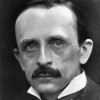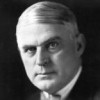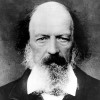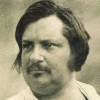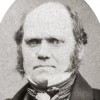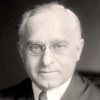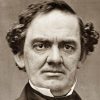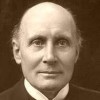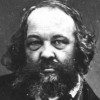You can hire logic, in the shape of a lawyer, to prove anything that you want to prove.
Oliver Wendell Holmes, Sr. (1809-1894) American poet, essayist, scholar
“The Autocrat of the Breakfast Table,” Atlantic Monthly (1857-11)
Collected in The Autocrat of the Breakfast Table, ch. 1 (1858).
In this respect, the freedom of the press is certainly for the state machine what the safety-valve is for the steam-engine. For by means of it, every dissatisfaction is at once ventilated in words and such grievance is soon exhausted if in it there is not very much substance. If, however, there is, then such ventilation is a good thing and enables the matter to be known in time and to be put right. This is very much better than forcing down the grievance so that it simmers, ferments, expands, and finally ends in an explosion.
[In dieser Hinsicht ist allerdings für die Staatsmaschine die Preßfreiheit Das, was für die Dampfmaschine die Sicherheitsvalve: denn mittelst derselben macht jede Unzufriedenheit sich alsbald durch Worte Luft, ja wird sich, wenn sie nicht sehr viel Stoff. hat, an ihnen erschöpfen. Hat sie jedoch diesen, so ist es gut, daß man ihn bei Zeiten erkenne, um abzuhelfen sehr viel besser, als wenn die Unzufriedenheit eingezwängt bleibt, brütet, gährt, kocht und anwächst, bis sie endlich zur Explosion gelangt.]
Arthur Schopenhauer (1788-1860) German philosopher
Parerga and Paralipomena, Vol. 2, ch. 9 “On Jurisprudence and Politics [Zur Rechtslehre und Politik],” § 127 (1851) [tr. Payne (1974)]
(Source)
(Source (German)). Alternate translation:
Freedom of the press is to the machinery of the state what the safety-valve is to the steam engine: every discontent is by means of it immediately relieved in words -- indeed, unless this discontent is very considerable, it exhausts itself in this way. If, however, it is very considerable, it is as well to know of it in time, so as to redress it.
[tr. Hollingdale (1970)]
“Why can’t you fly now, mother?”
“Because I am grown up, dearest. When people grow up they forget the way.”
“Why do they forget the way?”
“Because they are no longer gay and innocent and heartless. It is only the gay and innocent and heartless who can fly.”
Forgiving our enemys haz the same refreshing effekt upon our souls az it duz tew confess our sins.
[Forgiving our enemies has the same refreshing effect upon our souls as it does to confess our sins.]
Josh Billings (1818-1885) American humorist, aphorist [pseud. of Henry Wheeler Shaw]
Everybody’s Friend, Or; Josh Billing’s Encyclopedia and Proverbial Philosophy of Wit and Humor, ch. 144 “Affurisms: Gnats” (1874)
(Source)
If the concept of God has any validity or any use, it can only be to make us larger, freer, and more loving. If God cannot do this, then it is time we got rid of Him.
Who is this? And what is here?
And in the lighted palace near
Died the sound of royal cheer;
And they crossed themselves for fear,
All the Knights at Camelot;
But Lancelot mused a little space
He said, “She has a lovely face;
God in his mercy lend her grace,
The Lady of Shalott.”
From then on, when anything went wrong with a computer, we said it had bugs in it.
Grace Hopper (1906-1992) American admiral, computer scientist, educator
Speech (1981)
On the removal of a large moth from the Harvard Mark I experimental computer (9 Sep 1947). There are, however, earlier examples of the term "bug" for mechanical glitches and computer problems.
Extreme law is often extreme injustice.
[Ius summum saepe summa malitia est.]
Terence (186?-159 BC) African-Roman dramatist [Publius Terentius Afer]
Heauton Timoroumenos [The Self-Tormentor], Act 4, sc. 5, l. 48 (l. 796)
Alternate translations:
- "The highest law is often the greatest wrong."
- "Extreme justice is often extreme malice."
- "Rigorous law is often rigorous injustice."
So natural to mankind is intolerance in whatever they really care about, that religious freedom has hardly anywhere been practically realized, except where religious indifference, which dislikes to have its peace disturbed by theological quarrels, has added its weight to the scale.
I am convinced that our happiness or unhappiness depends more upon the way in which we meet the events of life than upon the nature of those events themselves.
Baron Wilhelm von Humboldt (1767-1835) German philologist, diplomat
Letter to Charlotte von Stein (12 Jan 1824) [tr. Couper (1849)]
Full text.
Alt. trans.:
- "For the light and shade, the happiness and unhappiness of a man's life, depend on the disposition with which he regards it. " [Stebbing (1849)]
- "I am more and more convinced that our happiness or our unhappiness depends far more on the way we meet the events of life than on the nature of those events themselves."
It is not enough to take steps which may some day lead to a goal; each step must be itself a goal and a step likewise.
Johann Wolfgang von Goethe (1749-1832) German poet, statesman, scientist
Conversations with Eckermann, “Conversations of Goethe: 18 September 1823” [tr. Oxenford (1850)]
(Source)
Even in common people, conceit has the virtue of making them cheerful; the man who thinks his wife, his baby, his house, his horse, his dog, and himself severally unequalled, is almost sure to be a good-humored person, though liable to be tedious at times.
Oliver Wendell Holmes, Sr. (1809-1894) American poet, essayist, scholar
“The Autocrat of the Breakfast-Table,” Atlantic Monthly (1857-11)
Collected in The Autocrat of the Breakfast-Table, ch. 1 (1858)
What is Art, monsieur, but Nature concentrated?
[Qu’est-ce que l’Art, monsieur? C’est la Nature concentrée.]
Honoré de Balzac (1799-1850) French novelist, playwright
Illusions perdues, Vol. 1 “Un grand homme de province à Paris,” Part 1 (1839)
Lost Illusions, Vol. 1 "A Distinguished Provincial at Paris" Full text.
Among the scenes which are deeply impressed on my mind, none exceed in sublimity the primeval forests undefaced by the hand of man. No one can stand in these solitudes unmoved, and not feel that there is more in man than the mere breath of his body.
I have carried a dinner pail and worked for day’s wages, and I have also been an employer of labor, and I know there is something to be said on both sides. There is no excellence, per se, in poverty; rags are no recommendation; and all employers are not rapacious and high-handed, any more than all poor men are virtuous.
Elbert Hubbard (1856-1915) American writer, businessman, philosopher
A Message to Garcia (1899)
Full text.
For man proposes but God disposes. The path a person takes does not lie within himself.
[Nam homo proponit, sed Deus disponit, nec est in homine via ejus.]
Thomas à Kempis (c. 1380-1471) German-Dutch priest, author
The Imitation of Christ [De Imitatione Christi], Book 1, ch. 19, v. 2 (1.19.2) (c. 1418-27) [tr. Creasy (1989)]
(Source)
Thomas saying that, regardless of a person's good intentions to act virtuously, they are dependent on God's grace to make that actually happen.
The phrase "Man proposes but God disposes" (or the Latin original of it) was coined by Thomas, which makes it ironic where some later translators put it in quotations or self-referent indeeds.
The text given relates to, is frequently footnoted to, and even is quoted directly from:
- Proverbs 16:9 ("A man's heart deviseth his way: but the Lord directeth his steps." [KJV])
- Jeremiah 10:23 ("O Lord, I know that the way of man is not in himself: it is not in man that walketh to direct his steps." [KJV])
(Source (Latin)). Alternate translations:
For man purposeth, but God disposeth: nay, the way that man shall walk in this world is not in himself but in the grace of God.
[tr. Whitford/Raynal (1530/1871)]
Man proposes, but God disposes. The way that a man shall walk in this world is found not in himself, but in the grace of God.
[tr. Whitford/Gardiner (1530/1955)]
For man doth propose but God doth dispose, neither is the way of man in his owne hands.
[tr. Page (1639), 1.19.9]
A Man's Heart deviseth his Way, but the Lord directeth his Steps, says Solomon: We may contrive and act as seems most adviseable; by which we do so, are from the Lord, so is the Event of our having done it entirely in his disposal.
[tr. Stanhope (1696; 1706 ed.), 1.19.3]
Tho' the heart of man deviseth his way, yet the Lord ordereth the event; and that it is not in man that walketh, to direct his steps.
[tr. Payne (1803)]
For man proposes, but God disposes; neither is the way of man in himself.
[Parker ed. (1841); Bagster ed. (1860); Anon. (1901)]
For man proposes but GOD disposes: nor is it in man to direct his steps.
[tr. Dibdin (1851)]
For man proposeth, but God disposeth; and the way of a man is not in himself.
[tr. Benham (1874)]
For man, indeed, proposes but God disposes, and God's way is not man's.
[tr. Croft/Bolton (1940)]
For man proposes, but God disposes, and a man's road is not within himself.
[tr. Daplyn (1952)]
Man proposes, but God disposes, and man's destiny is not in his own hands.
[tr. Sherley-Price (1952)]
They know that "man proposes, and God disposes"; the course of a man's life is not what he makes it.
[tr. Knox-Oakley (1959)]
For man proposes, God disposes, and it is not for man to choose his lot.
[tr. Knott (1962)]
Man indeed proposes, bit it is God who disposes nor is the course of man in his power as he goes his way.
[tr. Rooney (1979)]
If nowhere else, in the relation between Church and State, “good fences make good neighbors.”
Felix Frankfurter (1882-1965) US Supreme Court Justice, jurist and teacher
McCollum v. Board of Education (1948)
See Frost.
The individual is not accountable to society for his actions in so far as these concern the interests of no person but himself. Advice, instruction, persuasion, and avoidance by other people, if thought necessary by them for their own good, are the only measures by which society can justifiably express its dislike or disapprobation of his conduct.
John Stuart Mill (1806-1873) English philosopher and economist
On Liberty, ch. 5 “Applications” (1859)
(Source)
Coercion may prevent many transgressions; but it robs even actions which are legal of a portion of their beauty. Freedom may lead to many transgressions, but it lends even to vices a less ignoble form.
The desire for wealth is nearly universal, and none can say it is not laudable, provided the possessor of it accepts its responsibilities, and uses it as a friend to humanity.
P.T. Barnum (1810-1891) American showman [Phineas Taylor Barnum]
Art of Money Getting, ch. 20 “Preserve your integrity” (1880)
Full text.
To keep up and improve Friendship, thou must be willing to receive a Kindness, as well as to do one.
Thomas Fuller (1654-1734) English physician, preacher, aphorist, writer
Introductio ad Prudentiam, #1187 (1725)
(Source)
All generous minds have a horror of what are commonly called “facts.” They are the brute beasts of the intellectual domain.
People exaggerate both happiness and unhappiness; we are never so fortunate nor so unfortunate as people say we are.
[On amplifie également le malheur et le boneur, nous ne sommes jamais ni si malheureux, ni si heureux qu’on le dit.]
Sure he was great, but don’t forget that Ginger Rogers did everything he did, backwards … and in high heels.
Bob Thaves (1924-2006) American cartoonist
Frank & Ernest (1982)
About Fred Astaire. Earliest found reference, and credited to Thaves at the official Ginger Rogers site.
The greatest vicissitude of things amongst men is the vicissitude of sects and religions.
Francis Bacon (1561-1626) English philosopher, scientist, author, statesman
“Of Vicissitude of Things,” Essays, No. 58 (1625)
(Source)
She learned to love him before he thought it was even possible, so he didn’t have a chance to hide and mess it up and while it was a little scary at times, mainly he could not even imagine the world without her there.
Heaven ne’er helps the men who will not act.
Sophocles (496-406 BC) Greek tragic playwright
Philoctetes, fragment 288 (c. 409 BC)
(Source)
As translated in Edward Plumptre, The Tragedies of Sophocles, "Fragments," frag. 288 (2d ed., 1878), based on Karl Wilhelm Dindorf's numbering.
Common variant: "Heaven helps not the men who will not act."
The sentiment is a frequently repeated one. For more discussion of this family of quotations, see: God helps those who help themselves - Wikipedia.
Spuriously attributed to Sydney Smith, William Shakespeare, and Cicero. See George Herbert.
She left the web, she left the loom,
She made three paces through the room,
She saw the water-lily bloom,
She saw the helmet and the plume,
She looked down to Camelot.
Out flew the web and floated wide;
The mirror cracked from side to side;
“The curse is come upon me,” cried
The Lady of Shalott.
Wo be to him that reads but one book.
George Herbert (1593-1633) Welsh priest, orator, poet.
Jacula Prudentum, or Outlandish Proverbs, Sentences, &c. (compiler), # 1146 (1651 ed.)
(Source)
See this Latin proverb.
A thing is funny when — in some way that is not actually offensive or frightening — it upsets the established order. Every joke is a tiny revolution. … Whatever destroys dignity and brings down the mighty from their seats, preferably with a bump, is funny.
Be a Friend to thyself, and others will be so too.
Thomas Fuller (1654-1734) English physician, preacher, aphorist, writer
Gnomologia: Adages and Proverbs, # 847 (1732)
(Source)



